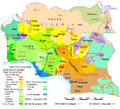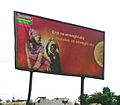Igbo language facts for kids
Quick facts for kids Igbo |
||||
|---|---|---|---|---|
| Ásụ̀sụ́ Ìgbò | ||||
| Native to | Nigeria | |||
| Region | Southern Nigeria | |||
| Ethnicity | Igbo people | |||
| Native speakers | 40 million (2023)e26 | |||
| Language family |
Niger–Congo
|
|||
| Standard forms |
Standard Igbo
|
|||
| Dialects | Waawa, Enuani, Ngwa, Ohuhu, Etche, Olu, Ika, Oyigbo, Anioma, Edda, Ukwuani, Ikwerre, Ezaa, Izzi, Ekpeye, Ohafia, Abam, | |||
| Writing system | Latin (Önwu alphabet) Nwagu Aneke script Ndebe script Igbo Braille |
|||
| Official status | ||||
| Official language in | ||||
| Recognised minority language in | Cameroon |
|||
| Regulated by | Society for Promoting Igbo Language and Culture (SPILC) | |||
| Linguasphere | 98-GAA-a | |||
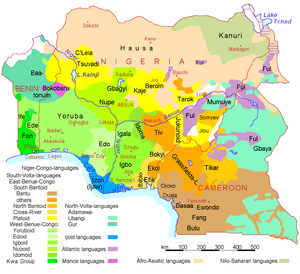
Linguistic map of Benin, Nigeria, and Cameroon. Igbo is spoken in southern Nigeria, Cameroon.
|
||||
|
||||
Igbo (pronounced EE-boh or IG-boh; Igbo: Ásụ̀sụ́ Ìgbò) is the main native language spoken by the Igbo people. They are a large group of people from Southern Nigeria.
There are about 15 different Igbo-like languages, depending on how you count them. The main Igbo language is usually seen as one language, but different groups who speak it might not always understand each other perfectly.
A standard version of the language, called 'Igbo izugbe' (meaning "general Igbo"), was created around 1972. It was based on dialects from Owerri, Anambra, and Umuahia. However, no one speaks "general Igbo" as their first language, and not all Igbo groups accept it. The largest dialect of the main Igbo language is Ngwa.
Contents
History of the Igbo Language
The first book to include Igbo words was History of the Mission of the Evangelical Brothers in the Caribbean, published in 1777. Soon after, in 1789, The Interesting Narrative of the Life of Olaudah Equiano was published in London. This book was written by Olaudah Equiano, a former slave, and it contained 79 Igbo words. His story also shared many details about Igbo life, based on his experiences in his hometown.
Later, in the 1850s, a Yoruba priest named Samuel Ajayi Crowther, with help from a young Igbo interpreter named Simon Jonas, created a first learning book for the Igbo language in 1857. The language was made more standard for church use with the Union Ibo Bible in 1913.
Central Igbo, a specific way of speaking, was based on dialects from the Owerri and Umuahia areas in Eastern Nigeria. Dr. Ida C. Ward suggested it as a written form in 1939. Over time, missionaries, writers, and publishers in the region started to use it.
Standard Igbo tries to mix Central Igbo with words from other Igbo dialects, including words borrowed from other languages. However, the famous writer Chinua Achebe strongly disagreed with these efforts to standardize the language.
Where Igbo is Spoken
Igbo is the main language in these Nigerian states:
Understanding Igbo Words
How Words are Used
In Igbo, words can be nouns (like names of things), pronouns (like 'he' or 'she'), numbers, verbs (action words), adjectives (describing words), and conjunctions (joining words). There is only one main preposition, na, which means its exact meaning changes depending on how it's used in a sentence. For example, na can mean 'in', 'during', or 'in' (as in believing in something).
Igbo has very few adjectives. There are only eight main ones, which come in pairs of opposites:
- ukwu (big) and nta (small)
- oji (dark) and ọcha (light)
- ọhụrụ (new) and ochie (old)
- ọma (good) and ọjọọ (bad)
Other descriptive meanings are shown using verbs or abstract nouns.
Verbs are very important in Igbo. Many new words can be made from verbs, but not many verbs are made from other types of words.
Igbo pronouns do not show if someone is male or female. So, the sentence ọ maka can mean "he is beautiful," "she is beautiful," or "it is beautiful."
Sounds of Igbo
Igbo is a tonal language. This means the meaning of a word can change based on the pitch of your voice when you say it. For example, the word akwa can mean:
- ákwá (cry)
- àkwà (bed)
- àkwá (egg)
- ákwà (cloth)
Because tone is not always written down, these words might all look the same in print.
Igbo also has vowel harmony. This means that vowels in a word tend to belong to one of two groups, based on how they are pronounced in the mouth. There are also nasal vowels, which are pronounced with air coming out of your nose.
When vowels are next to each other, they often blend together when spoken quickly.
Consonants in Igbo
Igbo has many different consonant sounds. Some dialects have unique sounds, like a special 'b' sound made by sucking air in.
Here is a simplified table of consonants in Standard Igbo:
| Lips | Teeth/ Gums |
Behind Gums | Palate | Back of Mouth | Lips-Back of Mouth | Throat | |||
|---|---|---|---|---|---|---|---|---|---|
| plain | rounded lips | ||||||||
| Stops/ Affricates |
no voice | p | t | ch | j | k | kw | kp | |
| voiced | b | d | g | gw | gb | ||||
| Fricatives | no voice | f | s | sh | h | ||||
| voiced | v | z | gh | ||||||
| Rhotics | r | ||||||||
| Approximants | m | n | ny | y | ng | nw | w | ||
Most Igbo words are made of a consonant followed by a vowel (like "ka" or "bi"). Every syllable has a tone.
How Igbo Sentences are Built
Igbo is an "isolating language," meaning words don't change much based on their role in a sentence. It mostly uses suffixes (endings added to words).
The usual order of words in an Igbo sentence is Subject-Verb-Object (SVO). For example, "He eats yam." The subject is the one doing the action.
Igbo does not have a "passive voice" (like "the ball was hit"). However, it can change how many things a verb acts upon.
Verb Chains
Igbo often uses "verb serialization," which means putting several verbs together in a row. This helps make up for not having many prepositions (words like "with" or "to"). For example, instead of saying "He peels yams with a knife," Igbo might say "He uses knife peels yam."
Writing System
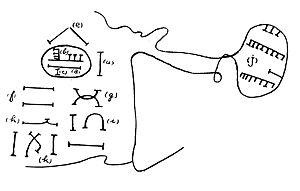
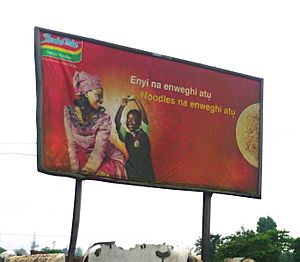
The Igbo people have used Nsibidi symbols for basic writing for a long time, possibly since the 1500s. These symbols were often used in secret societies. However, Nsibidi is not a full writing system that can write down every sound of the Igbo language.
In 1960, a man named Nwagu Aneke created his own writing system for the Umuleri dialect of Igbo. He used it to write hundreds of diary entries.
History of Igbo Spelling
Before an official way of writing Igbo existed, travelers tried to write down Igbo sounds using their own language's spelling rules. This was hard because Igbo has some unique sounds.
In the 1850s, a German language expert, Karl Richard Lepsius, created a "Standard Alphabet" for all languages. This became the first way to write Igbo. It had 34 letters, including special marks for African sounds.
This alphabet was replaced in 1929 by the "Practical Orthography of African Languages" (Africa Orthography). This new system had 36 letters and fewer special marks. But there were many disagreements about it, leading to its replacement in the early 1960s.
The Ọnwụ Alphabet
The current official Igbo alphabet is called the Ọnwụ alphabet. It's a mix of the older Lepsius alphabet and a newer one. Here are the letters and how they are pronounced:
| Letter | Pronunciation |
|---|---|
| A a | like 'a' in "father" |
| B b | like 'b' in "boy" |
| Ch ch | like 'ch' in "church" |
| D d | like 'd' in "dog" |
| E e | like 'e' in "bed" |
| F f | like 'f' in "fan" |
| G g | like 'g' in "go" |
| Gb gb | a special 'gb' sound, like saying 'g' and 'b' at the same time |
| Gh gh | like 'g' in "go" but softer, from the back of the throat |
| Gw gw | like 'gw' in "penguin" |
| H h | like 'h' in "hat" |
| I i | like 'ee' in "see" |
| Ị ị | like 'i' in "bit" |
| J j | like 'j' in "jump" |
| K k | like 'k' in "cat" |
| Kp kp | a special 'kp' sound, like saying 'k' and 'p' at the same time |
| Kw kw | like 'qu' in "queen" |
| L l | like 'l' in "love" |
| M m | like 'm' in "man" |
| N n | like 'n' in "no" |
| Ṅ ṅ | like 'ng' in "sing" |
| Nw nw | like 'nw' in "man-woman" (a bit tricky) |
| Ny ny | like 'ny' in "canyon" |
| O o | like 'o' in "go" |
| Ọ ọ | like 'aw' in "raw" |
| P p | like 'p' in "pen" |
| R r | like 'r' in "run" (often a tap sound) |
| S s | like 's' in "sit" |
| Sh sh | like 'sh' in "she" |
| T t | like 't' in "top" |
| U u | like 'oo' in "moon" |
| Ụ ụ | like 'oo' in "book" |
| V v | like 'v' in "van" |
| W w | like 'w' in "we" |
| Y y | like 'y' in "yes" |
| Z z | like 'z' in "zoo" |
Sometimes, tones are shown in writing. A low tone has a grave accent (like `à`), and a high tone has an acute accent (like `á`).
Other Ways of Writing Igbo
It has been hard to agree on one standard way to write Igbo. In 1976, a committee suggested changes to make it easier to type and show tones. However, these changes were not widely used.
Recently, there have been efforts to bring back and update the Nsibidi writing system, especially for Igbo.
Ndebe Script
In 2009, a Nigerian software engineer and artist named Lotanna Igwe-Odunze created a new native script called Ndebe script. It was updated in 2020 and is completely separate from Nsibidi. This script has gained attention for its clear and logical way of showing tones and different dialects, especially compared to the Latin alphabet.
Igbo Proverbs
Proverbs and idioms (ilu and akpalaokwu in Igbo) are very important to the Igbo people. Being good at the language means knowing how to use many proverbs in your speech. Chinua Achebe, in his famous book Things Fall Apart, said that proverbs are "the palm oil with which words are eaten." This means proverbs make conversations richer and more meaningful.
Proverbs are used to explain big ideas in just a few words. They can also be a polite way to say something difficult.
Igbo Language Around the World
Because of the Atlantic slave trade, the Igbo language spread to slave colonies in the Americas. For example, in Jamaican Patois, the word for 'you (plural)' comes from Igbo. Also, "Red eboe" was a term for a fair-skinned black person, possibly because some Igbo people were described as having lighter skin. The word "Soso" meaning "only" also comes from Igbo.
The word Bim, a name for Barbados, was used by enslaved people there. It is thought to come from the Igbo phrase bi mu (meaning "My people").
In Cuba, the Igbo language, mixed with other languages, is still used in ceremonies of the Abakuá society. This society is similar to the Ekpe society in Nigeria.
Today, Igbo people living outside Nigeria are working to make it easier for others to learn the language.
The Future of Igbo
Some people worry that the Igbo language might be disappearing. A 2006 report from UNESCO even suggested it could be gone within 50 years. Experts point to signs like fewer older people speaking only Igbo, and younger people not knowing the language as well. They also note that special Igbo sayings and proverbs are being used less.
One reason for this decline is the popularity of English in Nigeria. After Nigeria became independent, English became the official language. Many Igbo speakers see English as the language of success and opportunity. This can make them value Igbo less.
Children's knowledge of Igbo is also affected because they might not hear it spoken much at home. English is used in government, schools, and business in Nigeria. Also, with globalization, English is seen as a universal language for technology and economy. A study in 2005 showed that Igbo people preferred English for communication, entertainment, and media.
English words are often borrowed into Igbo. These words usually keep their English meaning but follow Igbo sound rules. For example, the English word "school" became sukulu in Igbo. People also often switch between English and Igbo in conversations.
The standardized Igbo language, which is used in schools and official settings, is made up of parts from many different Igbo dialects. Some worry that this standardization might cause the unique parts of individual dialects to be lost. Each dialect has special idioms and sayings that show different parts of Igbo culture.
Proverbs are a key part of the Igbo language, carrying cultural wisdom. However, younger generations are using proverbs less and less. A recent study found that young people knew fewer proverbs and didn't always understand when to use them properly, compared to older speakers.
Sample Text
Ndị dere Oziọma ndị ahụ maara na Jisọs ebiwo ndụ n’eluigwe tupu ọ bịa n’ụwa.
This means: The writers of those gospels knew that Jesus had lived in heaven before he came to earth.
Images for kids
-
An ikpe 'court case' recorded in nsibidi by J. K. Macgregor in the early 20th century.
-
An Igbo-language advertisement in Abia State, showing the letter ụ.
-
Igbo version of the Book of Mormon, with the letters Ị, Ọ and Ụ visible.
See also
 In Spanish: Idioma igbo para niños
In Spanish: Idioma igbo para niños
 | Charles R. Drew |
 | Benjamin Banneker |
 | Jane C. Wright |
 | Roger Arliner Young |



